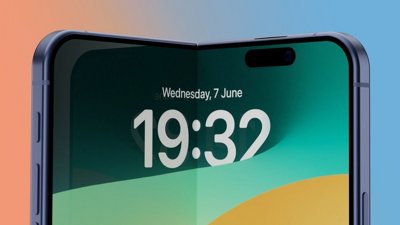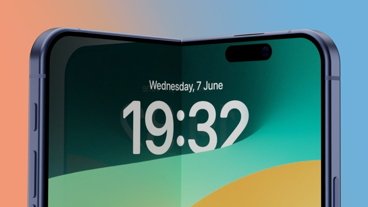According to a report by the Wall Street Journal, resumes of several key members of RIM's enterprise sales team have been updated to note they are now working for Apple.
The list includes Geoff Perfect, who worked as RIM's Head of Strategic Sales over the past five years before joining Apple in April 2009, where he now serves as the company's Head of Enterprise iPhone Sales.
RIM's Senior Global Sales Manager Joe Bartlett, Global Strategic Account Manager Steve Marshall and Global Account Manager Peter Decker all quit the company in the beginning of 2010 after working there for about four years. All three are now selling Apple iOS devices to businesses.
Paul Alvarez, another Global Strategic Account Manager for RIM with around five years of experience, also joined Apple in June, and is now selling iPhones and iPads to enterprise markets in Canada.
Apple confirmed that all five were now working for the company, but declined to elaborate. The report said RIM officials "weren't immediately available for comment."
Apple vs RIM
Apple's chief executive Steve Jobs first noted that the iPhone had outsold RIM's BlackBerry in 2008, in a quarterly peak of sales that hit 6.9 million units in the third quarter of that year.
This year, Jobs not only repeated that Apple has exceeded RIM in sales, selling 14.1 million iPhones to the 12.2 million devices RIM sold in its own most recent quarter, but also added, "I don't see them catching up with us in the foreseeable future. It will be a challenge for them to create a mobile software platform and convince developers to support a third platform."
Apple's ability to bypass RIM is significant because that company has a strong and loyal base of customers attached to its own messaging server infrastructure. Even Microsoft found it difficult to compete with RIM's "BlackBerry Enterprise Server," offering, forcing it to deliver its own equivalent for Windows Mobile for free.
Apple partnered with Microsoft to connect its popular Exchange Server to the iPhone after Windows Mobile itself failed to gain much significant traction among businesses, resulting in a powerful alternative to RIM's own hardware and messaging service package.
In contrast, while Android is gaining buzz as a large platform across a number of hardware vendors, it lacks full support for Exchange Server and other enterprise features that businesses value, including support for WiFi proxy servers, a variety of VPN implementations, and emerging open standards such as CalDAV.
Apple in the Enterprise
Apple has historically lacked much standing in enterprise markets outside of a niche role in publishing and graphic design with the Macintosh. Jobs' NeXT aimed its sales at enterprise markets, and after being acquired by Apple was largely converted into the revitalized company's enterprise group.
However, the new Apple wasn't taken very seriously in enterprise markets and its consumer focus resulted in most of its enterprise expertise being reallocated to scuttled. Even the relatively new Xserve and Xserve RAID products, both released in the last decade and aimed at business users, have since been discontinued.
However, the strengths of the company's iOS development platform and its competitively priced mobile hardware have reversed that situation. Jobs noted in the company's most recent conference call with analysts that even though the company hasn't pushed the iPad "real hard in business" that "it's being grabbed out of our hands."
He added, "we've got a tiger by the tail here, and this is a new model of computing which we've already got tens of millions of people trained on with the iPhone, and that lends itself to lots of different aspects of life, both personal and business."
The company also recently partnered with Unisys to service and develop solutions for enterprise users aimed at boosting sales of iPhones and iPads among businesses and in government.
 Daniel Eran Dilger
Daniel Eran Dilger
-m.jpg)






 Malcolm Owen
Malcolm Owen
 Andrew Orr
Andrew Orr


 William Gallagher
William Gallagher


 William Gallagher and Mike Wuerthele
William Gallagher and Mike Wuerthele


-m.jpg)






22 Comments
Ouch! Amazing they don't have contracts forbidding this for at least a year.
Ouch! Amazing they don't have contracts forbidding this for at least a year.
Are there any laws that can prevent headhunting between companies that operate in different countries?
Are there any laws that can prevent headhunting between companies that operate in different countries?
Ha ha good point, I forget Canada and US are different counties, forgive an ex Brit and noobie US citizen (I was thinking like England Scotland)
Clever move by Apple. It really is becoming cutthroat, this smartphone business.
They can poach sales people all days long, we still do not have effective tools to manage these iDevices in the enterprise as we do with RIM devices.
As far as companies not taking Apple seriously - the executive management at my employer (with over 400,000 employees) still thinks Macs are consumer toys and they will not spend a dime to manage them. I've tried several times and been told no despite what company policy states..
Apple has had plenty of time to develop enterprise solutions at the proper level and what do we have? And no IPCU doesn't even come close. Still waiting on 3rd party companies to hopefully provide [mature] solutions. Then, where is the budget for purchasing this since Apple did not provide anything? I know - rambling...